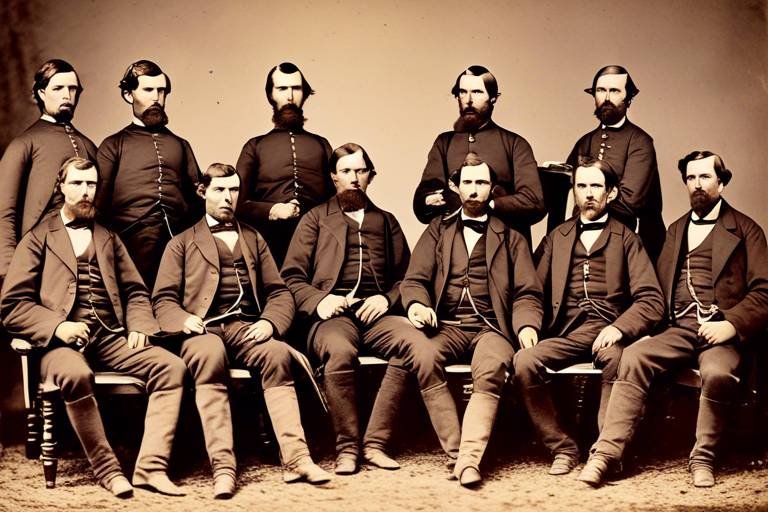Ancient Greece - The Origins of Democracy
Exploring the birth of democracy in Ancient Greece reveals a fascinating journey through history, shedding light on the roots of modern political systems. The ancient Greeks, known for their innovative thinking and philosophical ponderings, laid the groundwork for a revolutionary form of governance that continues to influence societies worldwide.
Ancient Greece, a land of city-states and intellectual prowess, witnessed the emergence of democratic ideals that challenged traditional notions of rulership and power. The democratic experiment in this ancient civilization paved the way for citizen participation and the collective decision-making process, setting a precedent for future generations to follow.
As we delve into the origins of democracy in Ancient Greece, we uncover a tapestry of political evolution shaped by visionary leaders and societal dynamics. From the bustling streets of Athens to the disciplined society of Sparta, each city-state contributed its unique flavor to the democratic discourse, creating a mosaic of governance styles and principles.
The legacy of Ancient Greek democracy transcends time, offering valuable insights into the essence of citizenship, civic duty, and the balance of power. By examining the historical context, key figures, and democratic principles of this ancient civilization, we gain a deeper appreciation for the foundations upon which modern governance stands.

The Rise of City-States
The rise of city-states marked a pivotal moment in the history of Ancient Greece, shaping the political landscape and laying the foundation for the development of democracy. These independent entities, such as Athens and Sparta, emerged as powerful centers of governance, each with its unique characteristics and governing principles.
Athens, known for its emphasis on democracy and civic engagement, became a beacon of political innovation during this period. The city-state encouraged active participation from its citizens in decision-making processes, setting a precedent for inclusive governance. In contrast, Sparta's militaristic society prioritized discipline and order, showcasing a different approach to governance within the city-state.
The city-states of Ancient Greece not only served as political entities but also as cultural hubs, fostering the exchange of ideas and the flourishing of arts and philosophy. The competition and cooperation among these city-states fueled advancements in various fields, contributing to the rich tapestry of Greek civilization.
As these city-states flourished and expanded their influence, they encountered challenges and conflicts that tested their resilience and adaptability. The rise of city-states not only transformed the political landscape of Ancient Greece but also set the stage for the evolution of democratic principles and governance systems that would shape the course of history.

Athenian Democracy
In the heart of Ancient Greece, the city-state of Athens stood as a beacon of democratic governance, pioneering a system that empowered its citizens like never before. At the core of Athenian democracy was the concept of direct participation, where every eligible individual had a voice in the decision-making process. Unlike modern representative democracies, where citizens elect officials to represent their interests, Athenian democracy thrived on the active involvement of its populace.
The cornerstone of Athenian democracy was the *Ekklesia*, or assembly, where citizens gathered to debate and vote on laws and policies. This direct engagement in political affairs gave Athenians a sense of ownership over their government, fostering a strong civic identity and a commitment to the common good. The courts of Athens also played a vital role in upholding democratic principles, ensuring that justice was administered fairly and transparently.
One of the defining features of Athenian democracy was its emphasis on equality before the law. Unlike the rigid social hierarchies of other ancient civilizations, Athens recognized the rights of all citizens, regardless of wealth or status. This inclusivity laid the foundation for a more egalitarian society, where individuals were judged not by their lineage but by their actions and character.
Moreover, the concept of *isonomia*, or equality of political rights, was central to Athenian democracy. Every citizen had the right to participate in the governance of the city-state, regardless of their background. This commitment to political equality set Athens apart from its authoritarian neighbors and paved the way for a more just and participatory form of government.
As we delve into the intricacies of Athenian democracy, we uncover a model of governance that valued the voices of its citizens and upheld the principles of freedom and justice. The legacy of Athenian democracy continues to inspire modern political thought, reminding us of the power of collective decision-making and the importance of active civic engagement.

Solon and Reforms
Solon, a prominent figure in Athenian history, implemented significant reforms that laid the groundwork for democratic principles in Ancient Greece. Known as one of the Seven Wise Men of Greece, Solon rose to power in the 6th century BC and introduced reforms aimed at addressing social, economic, and political issues within Athenian society.
One of Solon's key reforms was the abolition of debt slavery, a practice that had plagued the lower classes in Athens. By canceling the debts of the poor and prohibiting the enslavement of Athenian citizens due to debt, Solon sought to alleviate economic hardships and promote social stability.
Furthermore, Solon introduced constitutional reforms that aimed to balance the power between different social classes. He established a system of four property classes based on wealth, with each class having specific rights and responsibilities in the government. This system, known as the Timocracy, laid the foundation for a more inclusive and participatory form of governance in Athens.
In addition to his economic and constitutional reforms, Solon also implemented legal reforms aimed at improving the judicial system and promoting justice. He established a new code of laws that replaced the arbitrary decisions of magistrates with clear and consistent rules that applied to all citizens equally. This legal framework helped to ensure fair treatment and uphold the rule of law in Athenian society.
Overall, Solon's reforms were instrumental in shaping the trajectory of Athenian democracy and setting the stage for future developments in governance. His commitment to social justice, economic equality, and legal fairness laid the groundwork for a more inclusive and equitable society in Ancient Greece.

The Age of Pericles
During the Age of Pericles, Athens flourished as a center of democracy, art, and culture, marking a significant period in Ancient Greek history. Pericles, a prominent statesman and general, led Athens during this golden age, leaving a lasting impact on the city-state's governance and society. His leadership was characterized by a strong emphasis on democracy and civic engagement, fostering a sense of pride and unity among Athenian citizens.
Pericles' policies and reforms aimed to empower the Athenian people, promoting equality and participation in decision-making processes. Under his guidance, the Athenian democracy reached new heights, with the assembly serving as a forum for open debates and the enactment of laws. The flourishing arts and intellectual pursuits during this era reflected the vibrant spirit of democracy that permeated Athenian society.
One of the key legacies of the Age of Pericles was the construction of the Parthenon, a magnificent temple dedicated to the goddess Athena. This architectural marvel symbolized the cultural and artistic achievements of Athens, showcasing the city-state's commitment to excellence and innovation. The patronage of the arts under Pericles' leadership contributed to the flourishing of drama, philosophy, and literature in Ancient Greece.
Moreover, Pericles' emphasis on civic duty and collective responsibility strengthened the social fabric of Athens, fostering a sense of community and solidarity among its inhabitants. The democratic principles championed during his rule laid the foundation for a more inclusive and participatory form of governance, setting a precedent for future generations.
In conclusion, the Age of Pericles stands as a testament to the transformative power of democracy and enlightened leadership in shaping the course of history. Pericles' vision of a vibrant and democratic Athens continues to inspire contemporary societies, reminding us of the enduring legacy of Ancient Greek civilization.

The Spartan Model
The Spartan Model in Ancient Greece stood in stark contrast to the democratic system of Athens, reflecting a society built on discipline, militarism, and the prioritization of the state over individual interests. While Athens embraced a participatory form of governance where citizens had a direct say in decision-making, Sparta's model focused on a rigid social structure geared towards producing elite warriors.
At the core of the Spartan society was the Council of Elders, a group of experienced citizens who held significant power and influence. This council, made up of older men, played a crucial role in shaping policies, making decisions, and ensuring the stability of the state. Their wisdom and authority guided the direction of Spartan governance, emphasizing the importance of tradition and collective well-being.
Unlike Athens, where democratic principles flourished, Sparta's emphasis on military prowess and obedience to the state led to a society governed by a small group of elite individuals. Citizenship in Sparta was earned through military service and adherence to strict codes of conduct, fostering a culture of discipline and sacrifice for the common good.
While Athens valued individual freedoms and active civic engagement, Sparta prioritized the strength of the collective, viewing every citizen as a piece of the larger societal puzzle. This approach, while effective in creating a powerful military force, limited personal liberties and innovation, creating a society focused on conformity and duty.

Council of Elders
The Council of Elders in Spartan society held a position of significant authority and influence, shaping the governance and stability of the state. Comprised of experienced and respected citizens, this council played a crucial role in decision-making processes and ensuring adherence to traditional values and laws. The Council of Elders, also known as the Gerousia, was responsible for advising the Spartan kings, proposing laws, and overseeing the implementation of policies.
Members of the Council of Elders were selected based on their age, wisdom, and service to the state, embodying the ideals of Spartan society. Their primary focus was on upholding the principles of discipline, order, and the preservation of the Spartan way of life. The council's decisions were guided by a deep-rooted sense of duty towards the state and the well-being of its citizens.
Unlike the democratic system in Athens where all citizens had a voice in governance, the Council of Elders represented a more aristocratic form of government in Sparta. Their role was to maintain the traditional values of the society, uphold the laws established by Lycurgus, and ensure the continuity of Spartan customs and practices.

Legacy of Ancient Greek Democracy
Ancient Greek democracy left a profound legacy that continues to influence modern political systems around the world. The principles and practices established in Ancient Greece have shaped the foundation of governance and civic engagement in contemporary societies. The concept of democracy, with its emphasis on citizen participation and decision-making, has endured through the centuries, demonstrating the enduring impact of the ancient Greeks on the evolution of political structures.
One of the key aspects of the legacy of Ancient Greek democracy is the idea of equality and freedom. The notion that all citizens have a voice in the governance of their society, regardless of social status or wealth, remains a fundamental principle in many democratic nations today. The concept of equal rights and opportunities for all individuals, as championed in Ancient Greece, continues to be a cornerstone of modern democratic societies.
Moreover, the legacy of Ancient Greek democracy extends to the concept of rule of law and the importance of institutions in upholding democratic values. The establishment of courts, assemblies, and governing bodies in Ancient Greece laid the groundwork for the development of legal systems and checks and balances in modern governance. The idea of accountability and transparency in decision-making processes can be traced back to the democratic practices of Ancient Greece.
Furthermore, the legacy of Ancient Greek democracy serves as a reminder of the power of civic engagement and active participation in shaping the direction of a society. The commitment to public service and the collective good, as exemplified by the citizens of Athens and other city-states, continues to inspire individuals to be involved in the political process and advocate for positive change.
In conclusion, the legacy of Ancient Greek democracy endures as a testament to the enduring impact of the ancient Greeks on the development of political systems. By reflecting on the principles and practices of democracy in Ancient Greece, modern societies can learn valuable lessons in fostering inclusive, participatory governance that upholds the rights and voices of all citizens.

Lessons for Modern Democracies
When reflecting on the legacy of Ancient Greek democracy, it becomes evident that there are valuable lessons that modern democracies can learn from. The principles and practices established in Ancient Greece serve as a foundation for contemporary political systems, guiding governments towards more inclusive and participatory governance.
One key lesson that modern democracies can draw from Ancient Greece is the importance of citizen engagement. In the Athenian democracy, citizens were actively involved in decision-making processes through direct participation in the assembly and courts. This emphasis on citizen involvement highlights the significance of engaging the population in shaping policies and laws.
Moreover, the concept of equality and rule of law, fundamental to Ancient Greek democracy, remains relevant today. Upholding the rule of law ensures that all individuals are subject to the same legal framework, promoting fairness and justice within society. By learning from the Greek emphasis on equality before the law, modern democracies can strive towards a more just and equitable system.
Additionally, the balance of power and the system of checks and balances present in Ancient Greek democracy offer valuable insights for modern governance. The distribution of power among different branches of government, as seen in Athens and Sparta, serves as a safeguard against tyranny and abuse of authority. Implementing similar mechanisms in contemporary political structures can help prevent the concentration of power in the hands of a few.
Furthermore, the legacy of debate and discourse in Ancient Greek democracy underscores the importance of fostering open dialogue and diverse perspectives in modern democracies. The practice of reasoned debate and respectful disagreement, prevalent in the Athenian assembly, promotes critical thinking and informed decision-making. By embracing a culture of debate, modern societies can cultivate a more informed and engaged citizenry.
In conclusion, the lessons derived from Ancient Greek democracy offer valuable guidance for modern democracies seeking to enhance their governance practices. By embracing principles of citizen engagement, equality, balance of power, and open discourse, contemporary political systems can strive towards greater transparency, accountability, and responsiveness to the needs of the populace.
Frequently Asked Questions
- What is the significance of Ancient Greece in the development of democracy?
Ancient Greece is often considered the birthplace of democracy, as it laid the foundation for democratic principles and practices. The city-states of Athens and Sparta, in particular, played pivotal roles in shaping the concept of citizen participation in governance.
- How did Athenian democracy differ from modern democratic systems?
Athenian democracy was a direct form of democracy where citizens directly participated in decision-making processes through the assembly and courts. In contrast, modern democracies often involve representative systems where citizens elect officials to make decisions on their behalf.
- Who were some key figures that influenced Ancient Greek democracy?
Figures like Solon, known for his reforms in Athens, and Pericles, who led Athens during its golden age, were instrumental in shaping the democratic principles of Ancient Greece. Their contributions left a lasting impact on the evolution of democracy.
- What lessons can modern democracies learn from Ancient Greek democracy?
Ancient Greek democracy offers insights into the importance of citizen participation, the balance of power, and the need for inclusive governance. By studying the origins of democracy, modern societies can enhance their democratic practices and foster civic engagement.



















